How to Help Someone Mentally Struggling
When someone you care about is mentally struggling, a state where emotional pain overwhelms daily functioning and coping. Also known as emotional distress, it doesn’t always look like crying or breakdowns—it can show up as silence, irritability, withdrawal, or sudden changes in habits. You don’t need to be a therapist to make a difference. You just need to show up.
Most people don’t ask for help directly. They test the waters: "I’m fine," they say, while scrolling late at night or skipping meals. If you notice this, don’t wait for them to say the words. Start with simple, quiet support—"I’ve noticed you’ve been quiet lately. I’m here if you want to talk." No pressure. No fixing. Just presence. That’s often the first real help they’ve gotten in weeks. And it’s enough to keep them from feeling completely alone.
There are tools and systems that can back you up. mental health resources, structured supports like crisis lines, free counseling, and community programs. Also known as crisis intervention services, these aren’t just for emergencies—they’re for when someone needs a safe space to breathe before they can even say what’s wrong. In the UK, NHS mental health services, Samaritans, and local charities offer free, confidential help. You can help someone find them. You don’t have to solve everything. Just point the way.
Don’t fall for the myth that you need to have all the answers. You don’t. What matters is that you don’t turn away. People who feel seen, even for a few minutes, are less likely to spiral. And if you’re unsure what to say, just say: "I don’t know what to say, but I’m not leaving." That’s powerful. That’s healing.
Some people need professional help. Others just need someone to sit with them while they eat a meal or walk around the block. Both count. The line between support and intervention isn’t always clear—but your care is. Below, you’ll find real stories and practical guides from people who’ve walked this path: how to talk to someone in crisis, what to do when they won’t open up, how to access free mental health care in the UK, and when to push for professional help without overstepping. These aren’t theories. They’re what works when the stakes are real.

